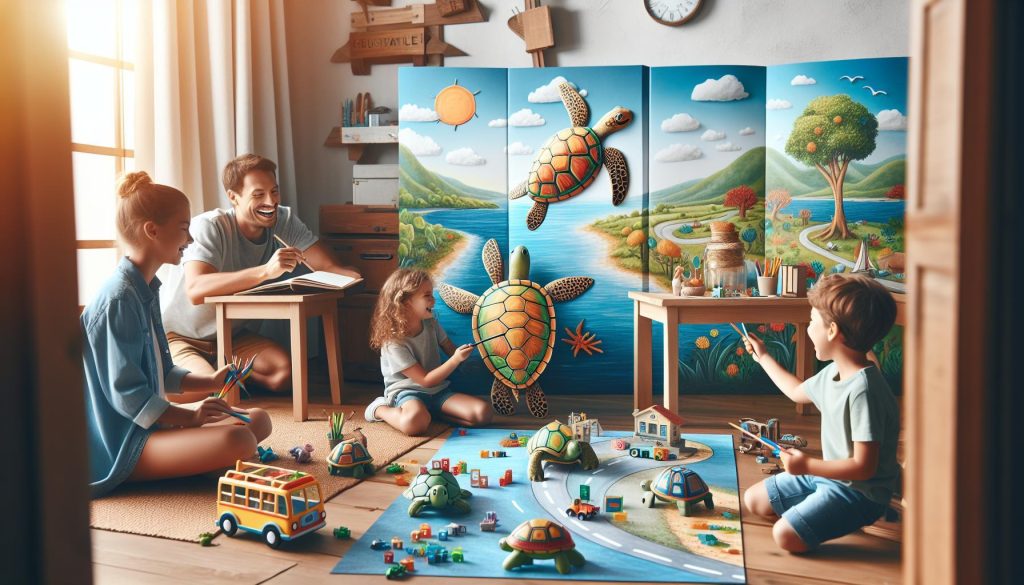Turtle Jokes for Kids That Will Have Them Laughing Out Loud
Are you ready to dive into a sea of giggles adn guffaws? If so, look no further than our treasure trove of “Turtle Jokes for Kids That will Have Them Laughing Out Loud!” Perfect for family gatherings, playdates, or simply lightening up those rainy days, these hilarious turtle-themed quips are sure to make your little ones snort with delight.With their slow and steady charm,turtles have always been a favorite among kids—and now,they can become a source of endless laughter! So,grab your little ones and prepare for some shell-raising fun.Who knew that humor could be so tortoise-ly awesome?
Turtle Jokes That Are Perfect for Young Audiences
Kids love a good laugh, and turtle jokes are the perfect way to tickle their funny bones! Here are some delightful turtle-themed jokes that are sure to bring smiles and giggles to young audiences:
- What do you get when you cross a turtle and a giraffe? A turtleneck that’s really tall!
- Why did the turtle cross the road? To get to the shell station!
- What did the turtle say after a long day? “I’m feeling a little shell-shocked!”
- Why don’t turtles use cell phones? as they can’t find a good “shell” service!
Here’s a fun table showcasing some classic turtle characteristics alongside these jokes:
| Turtle Traits | Related Joke |
|---|---|
| Slow movers | What did the turtle say after a long day? “I’m feeling a little shell-shocked!” |
| Long-lived | Why did the turtle cross the road? to get to the shell station! |
| Hard shell | What do you get when you cross a turtle and a giraffe? A turtleneck that’s really tall! |
| Underwater friends | Why don’t turtles use cell phones? Because they can’t find a good “shell” service! |
These lighthearted turtle jokes can be great conversation starters and perfect for school presentations, birthday parties, or just sharing a chuckle with friends. Encourage kids to come up with their own turtle jokes—it’s a wonderful exercise for creativity and laughter!
Understanding the Appeal of Animal Humor for Kids
Animal humor holds a special place in children’s hearts, often sparking joy and laughter at the simplest of jokes. One primary reason for this unique appeal is the underlying curiosity kids have about animals.they are naturally drawn to the quirks and characteristics of various creatures, making jokes about them not only funny but also relatable.When children hear a joke involving animals, they can visualize familiar scenarios, like a turtle trying to be fast or a bird who can’t sing, which enhances the humor and allows them to connect deeply with the punchline.
Moreover, animal jokes often engage children’s creativity in delightful ways. They can explore what it would be like if animals performed human-like actions, creating a whimsical twist in stories and jokes.As a notable example, a turtle racing a hare flips expectations on their head and introduces an element of surprise. Kids enjoy this playful distortion of reality, as it opens doors to creativity and storytelling. Some key elements that make animal humor particularly engaging include:
- Anthropomorphism: Assigning human traits to animals can lead to hilarious situations.
- Simplicity: Most animal jokes are straightforward and easy to understand, perfect for young minds.
- Alliteration: The rhythmic sound patterns in animal-themed jokes are catchy and memorable, enhancing their humor.
- Universal Appeal: Animals are a common interest among diverse groups, making these jokes accessible to all children.
When comparing diffrent types of humor, studies show that animal humor ranks high in terms of engagement with younger audiences. According to research, children who regularly engage with animal-based content tend to develop a stronger sense of empathy and creativity. Here’s a simple table illustrating the benefits of animal humor:
| Benefit | Description |
|---|---|
| Empathy | Understanding and relating to animal experiences fosters emotional intelligence. |
| Creativity | Animal jokes stimulate imaginative thinking and problem-solving skills. |
| Social Skills | Laughter promotes bonding and interactions among peers. |
| Language Development | Humor aids vocabulary growth and language comprehension in context. |
These dimensions illustrate why animal humor, particularly in the form of jokes, captivates children.As they giggle at playful punchlines, they’re not just enjoying a moment of amusement; they’re engaging with life lessons, expanding their minds, and building social connections. With every chuckle at a turtle joke, kids are discovering a world filled with curiosity, creativity, and camaraderie.
How Turtle Jokes Enhance Language Development and Social Skills
exploring the world of humor can be an exciting journey for children, particularly when it comes to delightful turtle jokes. These witty quips not only spark laughter but also serve as powerful tools in enhancing language development and social skills. Engaging children with humor encourages them to express themselves, leading to more robust communicative abilities.
When children hear a joke,they are prompted to think critically about the language used and the context in which it is delivered. This cognitive engagement allows them to:
- Understand wordplay and puns, which broadens their vocabulary.
- Identify and interpret humor nuances, paving the way for complex language structures.
- Build narrative skills by recalling jokes and sharing them with peers.
Moreover, sharing turtle jokes fosters social interaction, crucial for developing healthy relationships and strong interpersonal skills. Whether told during playtime or in a classroom setting, these jokes create opportunities for laughter and bonding, while teaching children about social norms and cues. the benefits extend beyond mere amusement:
- Children learn the art of timing and delivery, which are essential in storytelling.
- They practice empathy by gauging others’ reactions to their humor.
- Sharing jokes helps cultivate a sense of belonging and community.
| Joke | Language Skill Developed |
|---|---|
| What do turtles do on their birthday? They shell-a-brate! | Understanding puns and double meanings |
| Why don’t turtles use cell phones? Because they always take too long to dial! | Identifying timing in humor |
By integrating turtle jokes into everyday interactions, parents and educators can effectively support a child’s language and social development, making learning both fun and impactful. Encouraging children to share these jokes not only reinforces their understanding of language but also cultivates connections that are essential for their emotional and social growth.
Top Ten Turtle Jokes Approved by Kids and Parents Alike
Get ready to shell out some giggles with these turtle-themed jokes that have been carefully selected and joyfully endorsed by kids and parents alike! These delightful one-liners and puns are perfect for sharing with family and friends, creating laughter-filled moments that everyone will enjoy. Dive into the fun with the following jokes:
- Why did the turtle cross the road? To get to the shell station!
- What do you call a turtle that is really good at tennis? A turtle-serve!
- Why don’t turtles ever get lost? Because they always follow their shell-fie!
- What’s a turtle’s favorite type of music? Wrap!
- How do turtles communicate? They use shell-phones!
- What did the dad turtle say to his son? “Don’t be a slowpoke!”
- Why was the turtle so good at math? Because he was a little shellfish with his time!
- What do you get when you cross a turtle with a porcupine? A slowpoke!
- Why did the turtle break up with its girlfriend? It found her too shellfish!
- What do turtles use to keep their shells shiny? Turtle wax!
these jokes are perfect for adding some fun to storytime,classroom activities,or even family road trips. Kids love the playful wordplay,while parents appreciate the wholesome humor that fosters laughter and bonding.Don’t be surprised if you hear echoing giggles from every corner of the house as they share these jokes with friends!
tips for Telling Jokes to maximize Laughter
Engage Your Audience with Relatable Humor
When telling turtle jokes to kids, it’s essential to choose punchlines and scenarios that resonate with their experiences. Here are some strategies to enhance relatability:
- Use everyday Situations: Frame jokes around common daily experiences, like school, playtime, or meals.
- Incorporate Familiar characters: Engage kids by using references from popular cartoons or movies featuring turtles.
- Use Simple Language: Keep the jokes easy to understand and age-appropriate to avoid confusion.
Timing and Delivery Matter
The effectiveness of a joke often hinges on how it’s delivered.Here are some tips to nail your timing:
- Pace Yourself: Allow a brief pause before the punchline to build anticipation among listeners.
- Use Gestures: Enhance your storytelling with animated expressions or movements that mimic turtle actions.
- Vary Your Tone: Adjust your voice to match the emotions in the joke, creating a more engaging experience.
Encouraging Interaction
Make joke-telling an interactive experience. This keeps kids engaged and boosts laughter:
- Invite Responses: Ask kids to guess the punchline or to add their own twist to the joke.
- share a Joke Battle: Encourage them to think up their own turtle jokes and share them with the group.
- Incorporate Props: Use toy turtles or puppet characters to act out the jokes for added fun.
Choosing the Right Jokes
Not all turtle jokes are created equal; consider the following guidelines:
| Quality | Example |
|---|---|
| Simple Wordplay | Why don’t turtles like math? As they’re afraid of fractions! |
| Visual Humor | What did the turtle say when she had a baby? “I’m really shellfish!” |
| Funny Scenarios | How do turtles communicate? they use shell phones! |
creating a Fun Environment for Sharing Turtle Jokes
Creating an atmosphere that encourages children to share their favorite turtle jokes can be as delightful as the jokes themselves! It’s all about setting the stage for laughter and fun. Here are some ideas to foster a joyful environment:
- Themed decoration: Adorn the space with turtle cutouts, bright colors, and playful elements that capture the essence of these lovable creatures. Consider adding some sea-themed decorations to enhance the ambiance.
- Interactive Joke Wall: Designate a wall or board where kids can write down or draw their favorite turtle jokes. This not only promotes sharing but also gives them a sense of ownership and pride.
- Storytime Sessions: Host a weekly storytime where kids can read turtle-themed jokes aloud. This can turn into a fun performance, encouraging shyness to melt away in the spirit of laughter.
Incorporate game elements like joke contests or fun quizzes about turtles and their characteristics. You could even create a simple scoreboard to track who’s shared the funniest joke over a period:
| Child’s Name | Joke Shared | Laughter Rating (1-5) |
|---|---|---|
| Emma | Why did the turtle cross the road? | 4 |
| Jackson | What do you get when you cross a turtle with a giraffe? | 5 |
| Liam | How do turtles communicate? | 3 |
By weaving humor into everyday activities and encouraging creativity, kids will feel energized and motivated to unleash their inner comedians while bonding over turtle-themed laughter!
Incorporating Turtle Jokes into Learning Activities and Storytimes
Turtle jokes are not only hilarious but can also serve as a unique and engaging tool in educational environments.Incorporating these light-hearted quips into learning activities can enhance children’s cognitive skills while keeping the atmosphere fun and relaxed. Here are some practical ways to include turtle jokes in your lessons:
- Icebreaker Activities: Start your class with a turtle joke to break the ice. This sets a jovial tone and helps children feel more agreeable sharing their thoughts.
- Storytime Enhancements: When reading a story about turtles or nature,throw in a related joke. For example, after a passage, ask, “What do you get when you cross a turtle and a giraffe? A turtleneck that can reach the tree tops!” Children will love the connection and remember the story better.
- Creative Writing Prompts: Encourage kids to write their own turtle jokes.This combines humor with creativity, supporting language development and critical thinking.
Furthermore, organizing a joke-telling session can foster camaraderie among students. Establish a “Turtle Joke of the Day” where each child can present their favorite joke. To keep things organized, consider using a simple table to track who shares what:
| Student Name | turtle Joke |
|---|---|
| Emma | why do turtles never play poker? They can’t handle the pressure! |
| Jack | What did the turtle say to the giraffe? “You’re way over my head!” |
| Ava | What do you call a turtle with a hard hat? A shell-ebritation! |
By blending education with laughter, you create memorable learning experiences. These activities not only enhance comprehension but also promote social interaction, making turtle jokes a valuable addition to any learning environment.
Q&A
What are some classic turtle jokes that kids love?
Turtle jokes have a unique charm that captures the imagination of children. Many classic turtle jokes play on the slow and steady nature of these creatures, making them relatable and humorous. As an example, one popular joke goes, “Why wouldn’t the turtle cross the road? Because he didn’t want to get shell-shocked!” This punchline introduces a play on words, using “shell-shocked” to bring a fun twist to the concept of a cautious turtle.
Another favorite is, “What do you call a turtle who takes up photography? A snapper!” This joke not only highlights the leisurely lifestyle of turtles but also connects to the idea of snapping photos, creating a clever pun. Classic turtle jokes frequently enough use puns, making the humor accessible and enjoyable for kids, encouraging laughter and making these jokes memorable. By incorporating familiar themes and relatable scenarios, these jokes not only entertain but also offer an avenue for children to explore language playfully.
Why are turtle jokes beneficial for children?
Turtle jokes serve as more than just a source of entertainment; they provide multiple developmental benefits for children. Firstly, engaging with jokes enhances language development. When kids hear or tell jokes, they expand their vocabulary and comprehension skills. Jokes frequently enough use wordplay, like puns or alliteration, which helps children understand the nuances of language. Such as, identifying a pun in a joke requires a child to appreciate that words can have multiple meanings.
Additionally, telling and listening to jokes encourages social skills. Sharing a joke can foster connections with peers and family members. It teaches kids the rhythm of conversation,including timing and delivery,which are crucial components of effective communication. Research indicates that laughter can strengthen relationships and improve social dynamics, enhancing interaction skills among children. Groups of children laughing together over turtle jokes also help with emotional bonding, which is beneficial for their social development.
How can parents use turtle jokes to promote learning?
Parents can creatively incorporate turtle jokes into learning activities, turning them into fun and engaging ways to reinforce educational concepts. As a notable example, while reading with children, parents can pause to introduce a turtle joke related to the story or theme. This not only makes reading enjoyable but also helps in developing comprehension skills as children relate humor to content.
Furthermore, parents can use turtle jokes to introduce basic knowledge about turtles and their habitats. For example,while telling a joke like,”Why did the turtle bring a suitcase to the beach? As he wanted to shell out for a vacation!” parents can explain the different types of turtles,where they live,and what they like to do. This method creates a playful atmosphere while offering valuable information, thereby making learning a more dynamic experience.
Are there benefits to telling jokes within a classroom setting?
Absolutely! Integrating jokes like turtle jokes into classroom activities can substantially enhance the learning environment. Jokes can serve as icebreakers, helping to alleviate nervousness or tension among students. A shared joke fosters a sense of community, making students feel more comfortable and engaged. Additionally, teachers can use humor to capture students’ attention and make lessons more memorable. For instance, beginning a lesson with a turtle joke related to the day’s topic can set a positive tone and encourage active participation.
Moreover, telling jokes in class can promote cognitive skills. When children listen to jokes, they engage in critical thinking as they decode the punchlines and understand why something is funny. This engagement can foster a deeper understanding of the subject matter while strengthening their analytical skills. Research emphasizes that humor can create a conducive learning environment, improving retention rates and student motivation. As a result, turtle jokes not only contribute to academic learning but also enhance social interactions and build classroom rapport.
what other themes pair well with turtle jokes?
Turtle jokes can be seamlessly integrated with various themes, enhancing their charm and educational value. One effective pairing involves marine life or nature. jokes about turtles can naturally lead into discussions about ocean ecology, the importance of conservation, or the characteristics of different aquatic animals. Kids often find it engaging to learn about creatures that share the same habitat as turtles, making it a fun way to introduce broader topics in science or environmental studies.
Another compelling theme is friendship and teamwork. Jokes can be used to illustrate the themes of kindness and cooperation, particularly as turtles are often seen as gentle creatures. Such as, a joke about turtles working together can segue into lessons about collaboration and the importance of helping one another. By linking turtle jokes to relatable themes, educators and parents can create a robust learning experience that extends beyond laughter, fostering life lessons in a lighthearted, engaging manner.
How can kids create their own turtle jokes?
Encouraging kids to create their own turtle jokes is a fun and enriching activity that promotes creativity and language skills. Start by brainstorming with them. Ask children what they think about turtles’ habits, physical traits, or behaviors. For example, inquire what they might imagine a turtle doing in a funny situation. This process engages kids in critical thinking and observation, helping them find humor in everyday scenarios.Once they have brainstormed ideas, guide them to use wordplay or puns effectively. you could say, “Let’s think of words that rhyme with ’turtle’ or words that start with the same sound.” Providing examples from existing turtle jokes can inspire their creativity. As an example, if they say, “What do you call a turtle who is good at math?” you could encourage the punchline to be something like, “A turtle-wiz!” This exercise not only hones their understanding of humor but also enhances their confidence in language use and creativity, making for a delightful and educational experience.
To Conclude
laughter is a universal language, and what better way to ignite that joy in children than with some clever turtle jokes? As we’ve explored, humor not only entertains but also fosters creativity, enhances mood, and even helps improve social skills among kids. Research has shown that laughter can increase endorphins and create a sense of belonging—all critical components for childhood development. By sharing these delightful turtle jokes, parents and educators can create not only a fun atmosphere but also an engaging learning experience. So, whether it’s giggling with family during a quite evening or sharing a chuckle with classmates, these turtle jokes are sure to become a favorite. Keep the laughter flowing, and let the smiles flourish!





